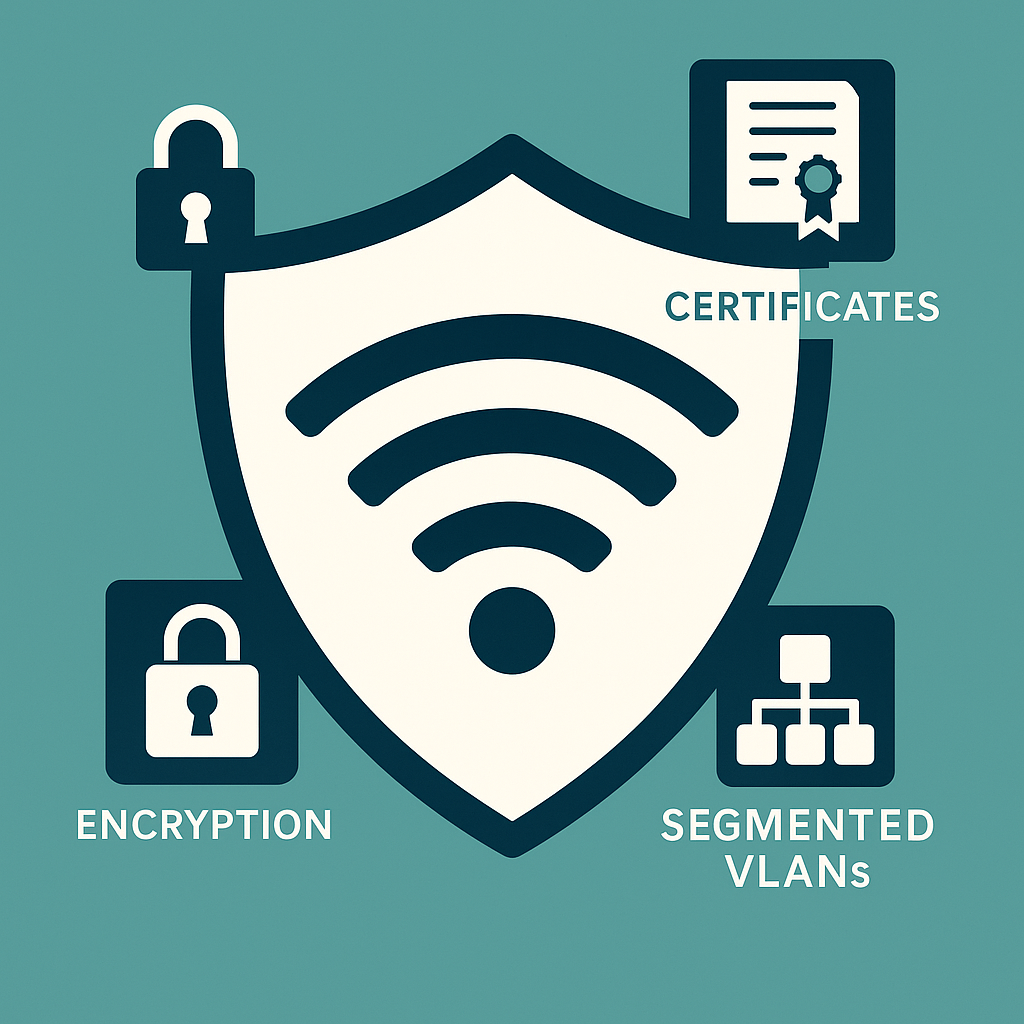In an era where wireless access is critical, privacy protection is no longer optional. Enterprises must protect personal data, proprietary information, and device identities across vast Wi-Fi networks while ensuring seamless connectivity. Toda combines product design, security architecture, and managed services to help enterprises ensure the privacy, compliance, and auditability of their wireless networks.
Privacy Risks in Wireless Environments
If left unchecked, wireless networks present a range of privacy risks:
Unauthorized access to company resources through weak authentication.
Unintended data collection from connected endpoints, guest users, and IoT sensors.
Disclosure of personally identifiable information (PII) due to inadequate segmentation or logging practices.
If the control channel is not encrypted, the management interface and telemetry data will be exposed.
Rogue devices and man-in-the-middle attacks against unsegmented SSIDs.
Addressing these risks requires a combination of technical controls, policies, and operational processes—each designed to minimize collection, limit exposure, and quickly detect misuse.
Core privacy measures every business should implement
Strong certificate-based authentication
Use WPA3-Enterprise with 802.1X and RADIUS to authenticate users and devices based on digital certificates rather than shared secrets. Certificate-based methods (EAP-TLS) eliminate reusable passwords and enable centralized identity lifecycle management.
Network segmentation and least privilege access
Enforce strict VLAN isolation for corporate users, guests, contractors, and IoT devices. Apply role-based access controls to ensure devices only access the resources they need. Micro-segmentation reduces lateral movement if a device is compromised.
Zero Trust and Device Posture Check
Integrate with a Network Access Control (NAC) or Zero Trust Network Access (ZTNA) solution to perform posture verification (OS updates, antivirus software, certificates) before granting network access. Devices that fail these checks are granted limited, monitored access.
Encryption Management and Telemetry
Secure the management plane using HTTPS, SSH, and certificate-based API authentication. Ensure telemetry and logs sent to the cloud or on-premises collectors are encrypted in transit and at rest.
Privacy-first recording and retention
Collect only necessary logs and anonymize or redact PII whenever possible. Define retention policies that balance incident response needs, data minimization, and regional privacy laws.
Secure access to BYOD and IoT
Automate secure configuration using device certificates and temporary credentials. Deploy IoT devices on isolated VLANs and restrict device functionality with ACLs and traffic filters.
Firmware Integrity and Secure Supply Chain
Use devices that support secure boot, signed firmware, and predictable update processes. Keep the firmware lifecycle under control to avoid vulnerable older versions.
Transparent guest and visitor flow
Implement a captive portal, display a privacy notice when required, and obtain appropriate consent. Isolate guest traffic from internal systems and use time-limited credentials.
Regular privacy risk assessments
Schedule regular audits and RF/site assessments to uncover inadvertent data collection points and verify that privacy controls remain effective as circumstances change.
A helpful configuration checklist for procurement and IT teams
All APs and repeaters are required to support WPA3-Enterprise and EAP-TLS.
Enforce 802.1X using hardened RADIUS clustering and certificate automation.
Ensure that the switches and controllers support VLAN tagging, ACLs, and per-SSID policy maps.
Verify that the management interface enforces HTTPS, SSH, and role-based administration.
Verify that the device includes secure boot and signed firmware mechanisms.
Define log retention windows, anonymization rules, and access controls for sensitive logs.
Request compliance documentation from suppliers (GDPR, ISO 27001, other regional certifications).
Includes lifecycle support SLA for critical security updates and vulnerability disclosures.
Compliance and Global Deployment Considerations
Different regions have different privacy obligations. Toda advises clients to:
Consider data localization, consent, and breach notification as procurement criteria.
Use local or regional cloud controllers when required by law.
Maintain an auditable chain of custody for certificates and key material across sites.
Toda offers templated policies and regional deployment options for multi-site customers to accelerate compliance without compromising performance.
Best practices for long-term privacy protection
Automatically issue and revoke certificates for employees, guests, and devices.
Employ role-based administrator accounts and a robust key rotation schedule.
Use anomaly detection to flag unusual access patterns or unexpected data flows.
Develop a tested incident response plan focused on containment, forensics, and notification.
Train employees and partners on privacy hygiene – weak human behavior is a common entry point.
Business benefits and procurement ROI
Investing in privacy controls reduces business risk and protects brand reputation. Benefits include:
Fewer violations, lower remediation costs, and reduced regulatory fines.
Improve customer and partner confidence when bidding on sensitive contracts.
Accelerate deployment cycles with a standardized, auditable onboarding process.
Lower total cost of ownership through centralized policy templates and remote management.
Why do companies choose Toda?
Toda offers hardware and services designed for privacy-focused deployments: secure access points (APs) and repeaters with enterprise-grade authentication, a centralized management platform that enforces segmentation and retention policies, and global professional services that configure networks to meet local regulatory requirements. For procurement teams, Toda provides clear documentation, long-term firmware support, and multi-region deployment expertise to ensure wireless projects are privacy-focused from the start.
Next Steps for B2B Buyers
If you’re responsible for wireless procurement or IT security, start with a privacy-focused site assessment. Toda’s engineering team will assess your current assets, map privacy risks, and provide a prioritized action plan based on your operational needs and regulatory environment.
Toda helps secure your wireless future—privacy by design, scale by engineering. Contact our enterprise team to schedule a privacy assessment and request documentation for global deployments.
Post time: Aug-30-2025




